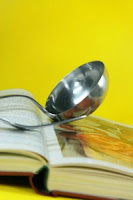If you have ever sat down in front of the TV with a microwave ready
meal and felt a degree of guilt watching one of the many celebrity chefs
preaching about their ‘healthy’ meals, perhaps you don’t need to be
worried anymore. A study featured in the Christmas edition on the British Medical Journal
website, even go on to claim that recipes included in TV shows from
chefs such as Nigella Lawson and Jamie Oliver show be given to viewers
with accompanying health warnings and be aired after the watershed. The
study authors also argue for nutritional information to be included on
recipes in cookery books.
The UK government and NHS Choices both argue that ready meals are
less healthy than meals prepared from scratch, and should be avoided if
possible. One of their arguments is that these types of meals usually
have a high saturated fat and sugar content, contributing to an
ever-increasing number of Britain becoming obese.
Obesity levels
are predicted to go through the roof over the next few decades, with
excess weight being responsible for a variety of health conditions such
as diabetes, cancer, heart disease and high blood pressure. Men who are overweight also risk suffering from erectile dysfunction problems.
Research that has been conducted in recent times have unearthed
evidence to show that consumers can be swayed in their dietary choices
by the unhealthy stigma attached to supermarket ready meals and
television chef recipes boasting about their suitability within a
healthy diet. However until now, there has been no study to be carried
out comparing the nutritional content of the two.
With this in mind, NHS Tees and Newcastle University teamed up to
compare the nutritional content of 100 ‘own brand’ ready meals from
three leading supermarket chains (Tesco, Asda and Sainsbury’s) and 100
recipes for main meals in bestselling books by TV chefs. Recipes were
analysed from ‘30 Minute Meals’ and ‘Ministry of Food’ by Jamie Oliver,
‘Baking Made Easy’ by Lorraine Pascale, ‘Kitchen’ by Nigella Lawson and
‘River Cottage Everyday’ by Hugh Fearnley-Whittingstall.
Upon analysis, researchers discovered that recipes by TV chefs were
less healthy than ready meals, comprising of ‘significantly more’
energy, protein, fat and saturated fat, and a lower total of fibre per
portion than the ready meals. If this wasn’t damaging enough, it was
also determined that the recipes from the TV chefs were more likely to
achieve ‘red traffic light’ labels according to the Food Standards
Agency criteria than ready meals. For those unaware, the traffic light
system works by having a postage-stamp sized sticker that states the
percentage of a person’s recommended daily allowance contained in each
product – red for high, amber for medium and green for low.
It was calculated that on average, the recipes conjured up by the
celebrity chefs contained 2,530 calories per portion and the ready meals
fared slightly better, with 2,067 per portion. However, it was found
that no meal option from either group reached the criteria set by the
World Health Organisation for a ‘balanced healthy meal’. In addition,
the study authors’ stress that any salt used for seasoning was not
considered in their analysis.
In their report, the authors say: “This study shows that neither
recipes created by popular television chefs nor ready meals produced by
three leading UK supermarket chains meet national or international
nutritional standards for a balanced diet. The recipes seemed to be less
healthy than the ready meals on several metrics.”
They further add that good nutritional intake ‘is likely to be
derived from home cooking of nutritionally balanced recipes primarily
using raw ingredients, rather than relying on ready meals or recipes by
television chefs’.
Concluding their findings, the authors comment: “Further
reformulation of ready meals in line with international nutritional
guidelines, and collaboration with television chefs to improve the
nutritional quality of their recipes, may also help consumers to achieve
a balanced diet.”
Overall, Medical Specialists Pharmacy would argue that not strictly
following the recipes from celebrity television chefs is the way to go.
Although, neither those nor ready meals appear to be meeting nutritional
guidelines and could be hindering attempts to maintain a healthy
weight. With Christmas around the corner and the over-indulgence that
this period brings, weight concerns are at their highest now more than
ever.
If you want to lose weight, this can be achieved by adopting a
healthy lifestyle and diet in conjunction with a medically proven weight
loss aid such as XLS-Medical, Alli, or the prescription medication
Xenical. All three weight loss aids are available today from Medical
Specialists at incredibly low prices.


No comments:
Post a Comment